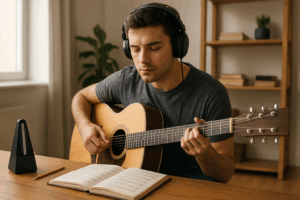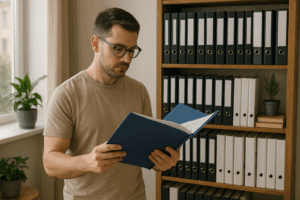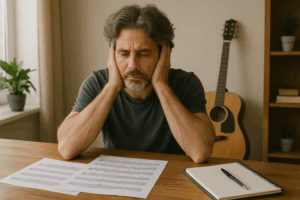Music lessons are an invaluable resource for anyone looking to improve their musical skills. Whether you’re a beginner learning your first instrument or an experienced musician seeking to refine your technique, music lessons can offer personalized guidance and a structured path toward your musical goals. However, simply attending lessons is not enough; making the most of your music lessons requires active participation, focused practice, and effective communication with your instructor. In this article, we’ll explore strategies to help you get the most out of your music lessons and accelerate your progress.
1. Come Prepared
One of the best ways to ensure that you make the most out of your music lessons is to come prepared. This means not only having your instrument ready but also reviewing the material you worked on during the previous lesson and practicing any assignments or exercises your teacher gave you.
How to Prepare for Your Lessons:
- Practice the Previous Material: Before each lesson, take some time to practice what you learned in the last session. This will help you remember the techniques and concepts discussed and allow you to make progress between lessons.
- Write Down Questions: If you have any specific questions or areas where you’re struggling, make a note of them so you can ask your teacher during the lesson. This will ensure that you don’t forget important details and help you address any difficulties you may be having.
- Bring Your Music and Materials: Always bring any sheet music, books, or materials your teacher provided, and be sure your instrument is tuned and in good condition before the lesson starts.
By coming prepared, you ensure that you maximize the time spent during the lesson and can focus on improving specific areas.
2. Be Open to Feedback and Constructive Criticism
During your lessons, your teacher will likely give you feedback on your playing. While this might feel intimidating at times, it’s important to be open to constructive criticism. Feedback is essential for growth and helps you become aware of areas where you can improve.
How to Handle Feedback:
- Listen Carefully: Pay close attention to what your teacher is saying. If something is unclear, don’t hesitate to ask for clarification or examples.
- Stay Positive: Don’t take criticism personally. Instead, view it as a valuable tool to help you improve. Everyone has areas where they need to grow, and feedback is the first step toward making that growth happen.
- Apply the Feedback: After each lesson, reflect on the feedback you received and incorporate it into your practice routine. Whether it’s adjusting your posture, improving your timing, or refining your technique, actively working on feedback helps you make steady progress.
Remember that feedback is a gift, and it’s a necessary part of the learning process.
3. Set Clear Goals with Your Teacher
Setting clear goals with your teacher is an excellent way to stay focused and motivated. Whether it’s mastering a specific technique, learning a new song, or preparing for a performance, having tangible goals gives you a roadmap for your lessons and helps you track your progress over time.
How to Set Effective Goals:
- Discuss Your Goals with Your Teacher: Talk to your teacher about what you want to achieve and how you envision your musical journey. Setting goals together ensures that both you and your teacher are on the same page regarding your musical aspirations.
- Break Down Big Goals: Large goals, like becoming proficient in a particular style or mastering an instrument, can feel overwhelming. Break these big goals down into smaller, achievable milestones. For example, instead of “learn the piano,” set a goal to “master the C major scale” or “learn a simple song.”
- Track Your Progress: Regularly assess your progress toward your goals. If you’re struggling, your teacher can help you adjust your approach or break things down further.
Setting and achieving goals will keep you motivated and provide a sense of accomplishment as you continue to improve.
4. Practice Consistently Between Lessons
Consistent practice is key to making progress in music. The more you practice, the faster you’ll improve. However, practicing effectively is just as important as practicing regularly.
How to Practice Effectively:
- Follow Your Teacher’s Instructions: Pay attention to the specific exercises or pieces your teacher asks you to practice. Practicing with intention, rather than aimlessly playing, will help you make faster progress.
- Use a Metronome: Practicing with a metronome is an excellent way to improve your timing and rhythm. It helps you stay consistent with your tempo and gives you a sense of musical timing.
- Focus on Weak Areas: Identify the areas where you’re struggling and dedicate extra time to practicing those sections. Whether it’s a difficult passage in a song or a specific technique, focusing on weak areas will help you improve faster.
- Take Breaks: Practicing for long stretches without rest can lead to burnout and physical strain. Make sure to take short breaks to avoid fatigue and keep your mind sharp.
By practicing regularly and with purpose, you’ll continue to build your skills and make significant progress between lessons.
5. Be Patient and Enjoy the Process
Learning music is a journey, and it’s essential to be patient with yourself along the way. Progress may not always be immediate, but each small step forward is a victory. Enjoy the process of learning and growing as a musician.
How to Stay Patient:
- Celebrate Small Wins: Don’t wait until you’ve mastered a whole song or technique before celebrating. Acknowledge the smaller victories, like learning a new chord or improving your finger strength.
- Embrace the Challenges: Music can be difficult at times, but challenges are part of the process. Instead of getting frustrated, embrace the opportunity to learn and grow.
- Stay Inspired: Keep yourself inspired by listening to music you love, attending concerts, or watching performances by musicians you admire. Inspiration can fuel your passion and keep you motivated.
Remember, the journey of learning music is just as important as the destination. Enjoy the experience!
6. Communicate with Your Teacher
Communication is key to a successful learning experience. If you’re struggling with a particular concept or technique, don’t hesitate to ask for help. Teachers are there to guide and support you, and open communication ensures that you get the most out of your lessons.
How to Communicate Effectively:
- Ask Questions: If something isn’t clear, ask for clarification. The more you understand, the more effectively you’ll be able to practice.
- Share Your Progress: Let your teacher know how you’re doing with your practice. If you’ve mastered something, they can offer more advanced material to challenge you.
- Be Honest: If you’re struggling with certain aspects of your playing, let your teacher know. Being honest about your difficulties allows your teacher to better tailor their lessons to your needs.
By fostering a good relationship with your teacher and maintaining open lines of communication, you’ll be able to make the most of every lesson.



